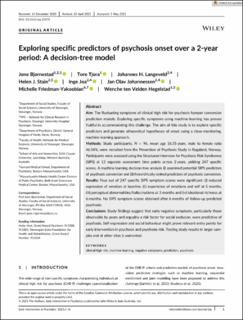Exploring specific predictors of psychosis onset over a 2‐year period: A decision‐tree model
Bjørnestad, Jone Ravndal; Tjora, Tore; Langeveld, Johannes Hendrik; Stain, Helen J.; Joa, Inge; Johannessen, Jan Olav; Friedman‐Yakoobian, Michelle; Hegelstad, Wenche ten Velden
Peer reviewed, Journal article
Published version
Permanent lenke
https://hdl.handle.net/11250/2767407Utgivelsesdato
2021-05Metadata
Vis full innførselSamlinger
Originalversjon
Bjørnestad, J., Tjora, T., Langeveld, J.H. et al. (2021) Exploring specific predictors of psychosis onset over a 2-year period: A decision-tree model. Early Intervention in Psychiatry. 10.1111/eip.13175Sammendrag
Aim
The fluctuating symptoms of clinical high risk for psychosis hamper conversion prediction models. Exploring specific symptoms using machine-learning has proven fruitful in accommodating this challenge. The aim of this study is to explore specific predictors and generate atheoretical hypotheses of onset using a close-monitoring, machine-learning approach.
Methods
Study participants, N = 96, mean age 16.55 years, male to female ratio 46:54%, were recruited from the Prevention of Psychosis Study in Rogaland, Norway. Participants were assessed using the Structured Interview for Psychosis Risk Syndromes (SIPS) at 13 separate assessment time points across 2 years, yielding 247 specific scores. A machine-learning decision-tree analysis (i) examined potential SIPS predictors of psychosis conversion and (ii) hierarchically ranked predictors of psychosis conversion.
Results
Four out of 247 specific SIPS symptom scores were significant: (i) reduced expression of emotion at baseline, (ii) experience of emotions and self at 5 months, (iii) perceptual abnormalities/hallucinations at 3 months and (iv) ideational richness at 6 months. No SIPS symptom scores obtained after 6 months of follow-up predicted psychosis.
Conclusions
Study findings suggest that early negative symptoms, particularly those observable by peers and arguably a risk factor for social exclusion, were predictive of psychosis. Self-expression and social behaviour might prove relevant entry points for early intervention in psychosis and psychosis risk. Testing study results in larger samples and at other sites is warranted.

